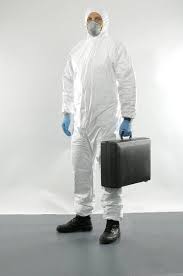How To Become A Crime Scene Cleaner In USA: Crime scene cleaning is a unique profession that requires a combination of technical skills, emotional resilience, and a strong stomach. This job involves cleaning up after traumatic events such as homicides, suicides, and accidents. While it’s not for everyone, for those who are drawn to it, crime scene cleaning can be a rewarding career. If you’re considering becoming a crime scene cleaner in the USA, here’s a comprehensive guide to help you understand the requirements and steps involved.
How To Become A Crime Scene Cleaner In USA
1. Understand the Job Role
What Does a Crime Scene Cleaner Do?
A crime scene cleaner, often referred to as a biohazard remediation technician, is responsible for cleaning, sanitizing, and deodorizing areas where a traumatic event has occurred. This includes:
- Removing blood, bodily fluids, and other biohazard materials.
- Disposing of items that cannot be cleaned.
- Restoring the scene to its original state.
2. Educational Requirements
While a college degree is not mandatory to become a crime scene cleaner, having a high school diploma or GED is typically required by employers. Some relevant courses or training programs that can be beneficial include:
- Biology and Chemistry: Understanding the nature of biohazards and chemicals used in cleaning.
- Psychology: To help in dealing with the emotional aspects of the job.
3. Obtain Necessary Certifications
Several organizations offer training and certification for crime scene cleaners, such as the American Bio Recovery Association (ABRA) and the National Institute of Decontamination Specialists (NIDS). These certifications cover:
- Biohazard cleanup procedures.
- Personal protective equipment (PPE) usage.
- Regulatory compliance.
- Safe disposal methods.
4. Gain Experience
While some companies offer on-the-job training, having prior experience in related fields can be advantageous. Consider working in:
- Janitorial services: To get accustomed to cleaning techniques.
- Medical fields: To understand biohazards and medical waste disposal.
5. Emotional and Physical Preparedness
Crime scene cleaning can be emotionally taxing. It’s essential to:
- Develop Emotional Resilience: You’ll encounter scenes that can be disturbing.
- Stay Physically Fit: The job can be physically demanding, requiring lifting, bending, and wearing PPE for extended periods.
6. Legal and Regulatory Compliance
Ensure you’re aware of the local, state, and federal regulations regarding biohazard cleanup and waste disposal. This includes:
- Obtaining necessary business licenses.
- Adhering to the Occupational Safety and Health Administration (OSHA) standards.
- Proper transportation and disposal of biohazardous waste.
7. Continuous Learning
The field of biohazard remediation is continually evolving. Stay updated by:
- Attending workshops and seminars.
- Renewing certifications.
- Joining professional associations.
8. Job Opportunities and Career Growth
Once you’re trained and certified, you can:
- Join an established crime scene cleaning company: Many companies operate nationwide and offer competitive salaries and benefits.
- Start your own business: If you have an entrepreneurial spirit, consider starting your own crime scene cleaning business.
Conclusion
Becoming a crime scene cleaner in the USA is a challenging yet fulfilling career choice. It requires technical expertise, emotional strength, and a commitment to helping families and communities recover from traumatic events. By following the steps outlined above, you can embark on a rewarding journey in this unique profession.





















